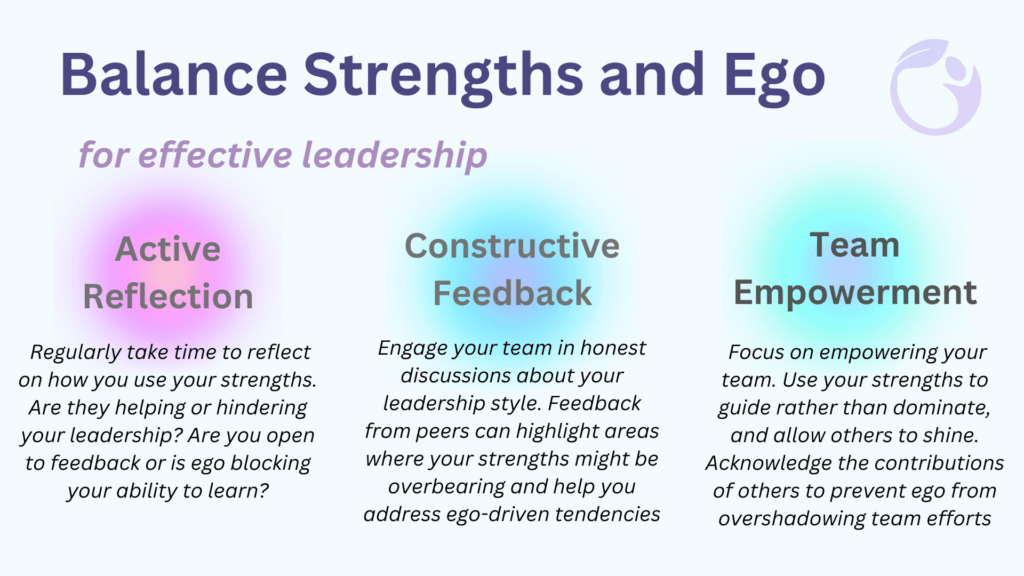Harnessing Self-Awareness to Balance Strengths and Manage Ego as a Leader for Continuous Growth

As leaders, we often rely on our strengths and specialties to guide teams, solve problems, and drive success. However, it’s crucial to understand that these very strengths, if unchecked, can give rise to arrogance and an inflated ego, hindering our growth and the growth of those around us.
Self-awareness plays a vital role in identifying not only our strengths but also recognizing when they morph into blind spots or potential weaknesses. By using self-awareness effectively, leaders can maintain a balance that fosters humility, continuous learning, and personal growth.
Here’s how self-awareness can help you as a leader:
1. Recognizing Strengths Without Falling into Arrogance
Leaders with self-awareness can see their strengths objectively. While it’s important to know your skills and specialties, being overly confident or relying too heavily on them can result in arrogance. By reflecting on how you use your strengths, you can ensure that they are applied in a way that empowers others rather than dominating them.
2. Identifying Ego as a Weakness of Strengths
When strengths turn into ego-driven behaviors, they can hinder team dynamics and collaboration. Self-awareness allows leaders to recognize when their strengths are overshadowing the contributions of others. For example, a leader who excels in decision-making may stifle creative input from their team if their ego takes over. Acknowledging this can lead to more inclusive leadership.
3. Balancing Confidence with Humility for Continuous Growth
Self-aware leaders understand that growth happens through humility. Instead of letting their strengths define them, they continuously seek feedback and improvement. This mindset helps avoid complacency, fosters adaptability, and encourages innovation
Post Title: Harnessing Self-Awareness to Balance Strengths and Manage Ego as a Leader for Continuous Growth
As leaders, we often rely on our strengths and specialties to guide teams, solve problems, and drive success. However, it’s crucial to understand that these very strengths, if unchecked, can give rise to arrogance and an inflated ego, hindering our growth and the growth of those around us.
Self-awareness plays a vital role in identifying not only our strengths but also recognizing when they morph into blind spots or potential weaknesses. By using self-awareness effectively, leaders can maintain a balance that fosters humility, continuous learning, and personal growth.
Here’s how self-awareness can help you as a leader:
1. Recognizing Strengths Without Falling into Arrogance
Leaders with self-awareness can see their strengths objectively. While it’s important to know your skills and specialties, being overly confident or relying too heavily on them can result in arrogance. By reflecting on how you use your strengths, you can ensure that they are applied in a way that empowers others rather than dominating them.
2. Identifying Ego as a Weakness of Strengths
When strengths turn into ego-driven behaviors, they can hinder team dynamics and collaboration. Self-awareness allows leaders to recognize when their strengths are overshadowing the contributions of others. For example, a leader who excels in decision-making may stifle creative input from their team if their ego takes over. Acknowledging this can lead to more inclusive leadership.
3. Balancing Confidence with Humility for Continuous Growth
Self-aware leaders understand that growth happens through humility. Instead of letting their strengths define them, they continuously seek feedback and improvement. This mindset helps avoid complacency, fosters adaptability, and encourages innovation.
Solutions for Leaders to Balance Strengths and Ego:
- Practice Active Reflection: Regularly take time to reflect on how you use your strengths. Are they helping or hindering your leadership? Are you open to feedback or is ego blocking your ability to learn?
- Seek Constructive Feedback: Engage your team in honest discussions about your leadership style. Feedback from peers can highlight areas where your strengths might be overbearing and help you address ego-driven tendencies.
- Promote Team Empowerment: Focus on empowering your team. Use your strengths to guide rather than dominate, and allow others to shine. Acknowledge the contributions of others to prevent ego from overshadowing team efforts.
Key Points of Self-Awareness in Leadership Growth:
- Understanding the fine line between confidence and arrogance allows leaders to inspire trust and collaboration without overpowering their team.
- Using self-awareness to manage ego ensures that leadership remains inclusive and adaptive to team feedback and growth.
- Balancing humility with strength leads to continuous learning and personal development, creating a culture of growth within the organization.
By consciously reflecting on how your strengths impact your leadership, and using self-awareness to manage ego, you can unlock your true potential as a leader while fostering an environment where both you and your team can thrive.
#SelfAwareness #LeadershipGrowth #PersonalDevelopment #EmpathyInLeadership #EgoManagement #ContinuousLearning #TeamEmpowerment #oneoat #oneoatfoundation